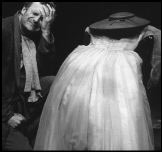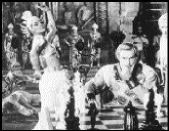Three years ago, in the summer of 2000, analysts scratched their heads when Red Hat, the company that made the Linux operating system popular, devoured the Campbell Soup Company. What did the software company that had only been public for a year know about processing chickens and vegetables? Was it really, as their CEO said, Red Hat’s desire to “bring the philosophy of open-source to the food products industry?”
No one was more puzzled than Linux rival Microsoft, but Redmond wasted no time rejecting the new model. “We believe consumers are better served keeping their bits and their bisque separate,” quipped Microsoft’s CEO Patty Peterson. “The PC desktop is no place for hot things that spill!”
Like the America Online-Time Warner merger a few months before, it was billed as “a merger of equals.” Red Hat’s bloated stock price made it worth over $17 billion, $2 billion more than Campbell. In the heady days of the Internet bubble, any young upstart technology company could swallow one of America’s venerable institutions.
The AOL-Time Warner deal had awakened the CEOs of technology companies to the truth that the party couldn’t last forever. Like a crowd rushing from a house on fire, they followed Red Hat’s example to acquire a “real” business to protect their newfound but vulnerable wealth.
So began the most peculiar land-rush that Wall Street had ever seen. RealNetworks ($12B) negotiated a chicken-feed buyout of Ralston Purina ($8B). Not to be outdone, eBay ($18B) swapped stock for Caterpillar ($18B). The haste to merge lacked any strategy. When Drugstore.com ($1.3B) bought Tupperware, their CEO could only lamely offer, “People need to put those little pills in something.”
When Amazon.com bought USX Corp. (formerly US Steel) for only a tenth of its stock, Jeff Bezos crowed, “We will take on Home Depot in the most direct possible way, by marketing to the true do-it-yourselfer. We will offer raw sheet metal and steel beams direct to your door from the Internet.”
In one of the more bizarre twists, Cisco Systems cornered the market on “Bowie Bonds,” the debt instruments sold by rocker David Bowie. They soon leveraged this to a complete buyout of Mr. Bowie himself, absorbing him into the Cisco empire, where he’s now in tech support.
When the hot technology companies applied New Economy approaches to their purchases, however, things began to sour. Oracle, the database company that bought Proctor & Gamble, soon discovered that there was no “enterprise market” for laundry soap. A payola scandal erupted when the classic “Meow Mix” jingle mysteriously shot to the top of RealNetworks’ “Real Jukebox” downloads. eBay found that auctioning farm machinery on the Web presented unique delivery problems. And when the recipes for Campbell’s soups were published online, customers lost their appetites.
Once Oracle-Proctor & Gamble returned to consumer products, the FDA was flooded with complaints. “Shampoo and conditioner are inseparable,” defended a company spokesperson. “If innovation is to occur, they must be allowed to develop together as part of the hygiene system.” Customers who used OP&G shampoo with another manufacturer’s conditioner allegedly suffered cave-ins of the head.
Yahoo, valued at $105 billion, stunned the nation with their purchase of both General Motors ($47 billion) and Ford ($63 billion). After the combination company’s leveraged buyout of Exxon-Mobil, they revolutionized the industry—and plunged into bankruptcy—by giving away SUVs painted with advertisements and charging exorbitant “license fees” for gasoline.
Everyone watched for a move by Microsoft, but the ongoing antitrust suit limited the company’s choices. Redmond tried to deflect the government’s ire through a series of CEO resignations—first Gates, then Ballmer. Finally the company recruited a more sympathetic public face in Patty Peterson, a disabled Native American veteran single mother in recovery. With stock prices of the new tech-hybrid companies dwindling, she recognized the time to go on a shopping spree. One by one, she picked them off like skeet.
So there was little surprise when she stood on the dais with a stuffed and mounted Jack Welch, announcing the merger of Microsoft with General Electric, the world’s second highest-valued company, to form the first trillion-dollar corporation. “Frankly, we were getting tired of them breathing up our skirts,” Peterson said. “It’s a merger of equals. Right, Jack?”
Last week, Microsoft’s aggressive purchase of outstanding US Treasury Bonds gave them a majority interest in the $3.6 trillion debt of the federal government. So yesterday’s announcement by the Attorney General that the Justice Department would no longer pursue the antitrust case against Microsoft raised lots of eyebrows. The Administration continues to deny any connection between the two events.
How did Microsoft do it? Answers Peterson: “Just used the old noodle.”








